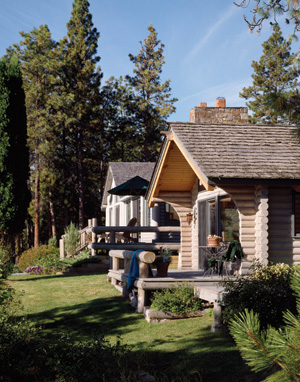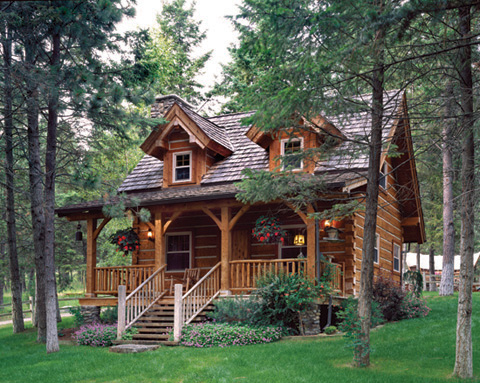But all these factors mean nothing if you can’t afford to carry the mortgage each month. So sometimes making our dreams come true requires a bit of ingenuity. One way to ease the financial burden is to rent your home to vacationers while you’re not there. Though this tactic could help reduce the monetary pressure, it may introduce new stressors, mostly related to income levels, maintenance, trust, and others. Ask yourself the following questions to help you decide if taking the leap to second-home ownership by renting your property is for you.
1. Will people rent it? If building a log cabin is in your future (and if you’re reading this magazine, that’s very likely), you already have a leg up over the competition, because log homes have an intrinsic “home away from home” charm that make them more desirable than any other kind of vacation rental. A few considerations, though—to be successful, your cabin should be located in or near sought-after vacation spots. Being isolated in the mountains can be wonderful but can reduce the number of prospective vacationers, and, thereby, your rental income.
2. How much should I charge? Of course you’re thinking of renting your cabin to offset your mortgage, but “covering” your mortgage may not be possible. On the other hand, with strategic planning, you may be able to turn a tidy little profit on your house. Either way, it’s vital to establish a competitive rental fee. Research what other rentals in the area are bringing in and what amenities they offer for their fees. Whether your home is already constructed or you’re in the early stages of floorplan research, consider what your home will offer with an objective eye and price accordingly. Then, clearly articulate what a renter will get for the money AND what your expectations are while they stay in your home. For example, timeshares provide a clear list of what the occupants are responsible for (laundry, dishes, and overall cleanliness; breakages; etc.) during their stay—you should do the same.

Timberlake Builders. Inc./photo by Roger Wade
3. Who will maintain my home away from home? If you’re the only one using your second home, then the answer to this question is simple—you are. But if you choose to rent it to vacationers, and if your second home is located far away from your primary residence, you’ll have to secure a professional cleaning service. If you have manicured landscaping, you’ll also need to hire someone to cut the grass and keep the plantings trimmed and away from the logs to ensure your investment is protected.
4. How will people know my cabin is available? You can advertise your log cabin yourself—many people do that quite successfully, but it does require a little time and effort. Fortunately, there are a lot of online vehicles out there especially designed to help get the word out about your home. Homeaway.com, Vacationrentals.com, and VRBO.com are three such websites that can help you promote your vacation cabin easily and reliably.
If you prefer, you can use a professional management company, but keep in mind that they can charge upwards of 25 to 35 percent of your rental fee. For that money, you do get some maintenance and security perks, which can offset the amount you’d spend on contracting these services separately (plus you may be able to claim this expense on your taxes [see Tax Implications box]), so weigh all factors before making your decision.
5. Can I trust my renters? That is the big unknown. You like to think people are trustworthy and most are. To gain some peace of mind, interview potential renters and trust your instincts. Keep an inventory of communal items and check it when renters check out. For further insurance, don’t keep any valuables on site or store them in an “owner’s closet” that is locked while you’re not there.

